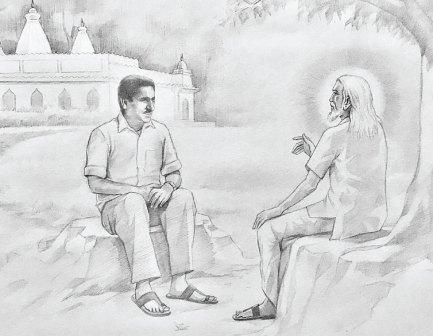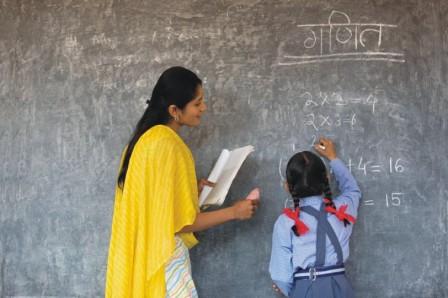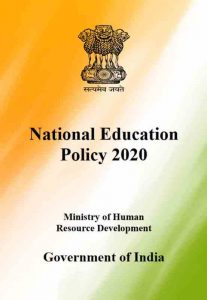

The article highlights the importance of healthy mentoring in early education for both students and teachers. Mentoring of students is even more important today, to address the near-unlimited, unbounded, and unprecedented access to all types of information that the Internet has enabled in recent decades. Formal education requires careful curation of information and filtering for authenticity, relevance, age-appropriateness, and credibility. This can be hard to achieve in a completely self-directed way during early years of schooling, until appropriate skills like critical thinking and research methods have been taught in addition to literacy. This is where mentoring can play an important role as a complement to instruction received from professional teachers.
Guru, Gurukul and Guru Purnima are concepts from ancient Indian Vedic tradition and possibly other cultures, that refer to a monastic style of learning. The more recent Sikh tradition with origins in the Indian subcontinent created institutions such as Gurdwaras, which discouraged monasticism in favour of inclusive education and full participation in public life for social good .
In modern times, as human knowledge advanced, these were complemented by modern school systems and universities for general and advanced education . However, in the digital era and with the recent lockdowns, it seems like even schools have been replaced by the one and only, seemingly omnipresent, “Google”. Everyone instinctively looks up Google for learning or knowledge in any subject.
 The authenticity of Google search engine’s results is rarely questioned, and it is often preferred as quick, un-interfering, non-obligatory, versatile gateway to ever increasing human knowledge with different levels of authenticity and credibility.
The authenticity of Google search engine’s results is rarely questioned, and it is often preferred as quick, un-interfering, non-obligatory, versatile gateway to ever increasing human knowledge with different levels of authenticity and credibility.
Besides, with the havoc wreaked by the Covid-19 pandemic for the last two years, educational institutions are closed, and students are only bound to follow an online mode of education, which can include real-time coaching by teachers via videoconferencing, and a lot of self-learning via online tools that include Google.
Classroom teaching has its own importance, as along with face-to-face interaction, it offers some desirable boundaries set by teachers and the educational system, such as a well-defined and age-appropriate syllabus, regular assessments, and enforcement of discipline.
A passive tool such as Google cannot be a replacement for these valuable aspects of an education system, as students in their formative years can lack the skills necessary for structured self-learning, and for evaluating the credibility of the material they get access to.
Therefore, mentorship has an even greater importance during school years today but also in advanced education. In fact, dedicated individual tutoring is an established practice in some leading universities .

Though mentoring is required in almost all walks of life, it is of utmost importance in career-oriented and goal-oriented learning.
A mentor shares information about their personal or others’ life journey towards their career path with their mentee. They provide guidance, motivation, emotional support, and can even serve as role models.
A mentor may help with exploring careers, setting goals, developing contacts, and identifying resources. Tutoring, guardianship, and mentoring activities have the same objectives. Parents, teachers, senior students, colleagues, friends, or any member of society with a suitable background can serve as a mentor to help with learning and motivation.

These activities were inseparable in ancient Indian Gurkul education system, where a student simply used to surrender himself to the grace of his guru, staying away from society in a monastic setting with the guru’s family.
As human knowledge advanced, a single teacher could not possibly offer the full spectrum of learning necessary in modern life.
In recent centuries, each year of schooling added increasing levels of specialism, starting with different teachers qualified to teach different subject areas, such as sciences, history, and mathematics.
Additionally, the Sikh tradition further restricts the concept of “Guru” to discourage general blind faith in individuals, whilst encouraging learning specific skills from anyone qualified to teach these. But, with the growing materialism in education and life, and a growing population and large teacher-to-student ratios, formal education in modern times can lack important aspects of personal mentoring.
Sometimes, teachers are named as tutor-guardians and senior students are appointed as mentors or peer-mentors, with new or junior students as their mentees. It is quite possible for mentor-mentee relationship to last for many years where appropriate, although as part of a formal system, it must be subject to regular review, evaluation and monitoring.

An effective mentor with advanced knowledge or proven accomplishment in some field can offer leadership and guidance to help grow the professional capability of the learners and colleagues they support.
An effective mentor having a sound domain or pedagogical knowledge and skill base for their role can establish respectful and effective mentoring relationships. Mentors may also be effective if they come from different parts of the society, such as farmers, community leaders, scientists, engineers, industry leaders, local government officials and many others.
Such mentoring can offer multiple perspectives that can make education very relevant to immediate challenges of our surroundings, local cultures, and local economies. It needs to be part of a comprehensive capacity building programme, well supported by employers, governments, corporations, and education boards.
Effective mentors are not only good at providing instruction to students, but they can complement professional teachers who are good at providing personal and instructional support to learners at different levels from primary to advanced years.
Mentors can engage in mentoring activities, such as attending training sessions, preparing mentoring materials, observing, giving constructive feedback, and meetings with their mentees. Online tools such as videoconferencing can easily scale up this process whilst allowing suitable mediation by parents and teaching community.
 Besides individual students, new and even teachers can benefit from mentoring programs. Teachers who have demonstrated excellence in their profession can offer their knowledge and guidance to other teachers not just within their own schools, but to teacher training programs locally, nationally or globally.
Besides individual students, new and even teachers can benefit from mentoring programs. Teachers who have demonstrated excellence in their profession can offer their knowledge and guidance to other teachers not just within their own schools, but to teacher training programs locally, nationally or globally.
The experienced mentor offers inductee teachers an anchor of support in often challenging and demanding situations and a smooth transition from inductee teacher to an effective professional teacher.
Many formal systems, such as the Montessori method for early education are even offered in the form of specialised consultancy to train teachers and even parents globally . However, these must be carefully assessed for suitability, outcomes, and local needs.
Research indicates that with good teacher mentoring programs, the quality of teaching and learning offered by inductee teachers is demonstrably more effective , and they may experience less stress, anxiety, and risk of attrition.
Responsibility of performance evaluation, particularly the implementation and practice aspects of learning acquired by inductee teacher lies with the mentor teacher (supervisor). Assessment of work done by the inductee teacher can be done by the mentor teacher who would maintain records of their mentee’s progress.
 As per National Education Policy 2020, Mentoring is considered as a National Mission. Govt. of India through Ministry of Education, University Grants Commission and AICTE are organizing various activities like orientation training programmes/mentoring workshops for mentors/faculty to make mentoring more relevant.
As per National Education Policy 2020, Mentoring is considered as a National Mission. Govt. of India through Ministry of Education, University Grants Commission and AICTE are organizing various activities like orientation training programmes/mentoring workshops for mentors/faculty to make mentoring more relevant.
Let us hope that while implementing NEP-2020 educational institutes and teachers will give more stress towards mentoring of students, so that students feel safe, protected, motivated, and free to share their thoughts with their teachers in the spirit of open-minded enquiry.
 To conclude, mentorship programs can complement professionally qualified teachers and can alleviate the burden of a high student-to-teacher ratio. Mentors can be from various walks of life to offer a range of perspectives that can make education more relevant to local economies, and help students to develop constructive career goals.
To conclude, mentorship programs can complement professionally qualified teachers and can alleviate the burden of a high student-to-teacher ratio. Mentors can be from various walks of life to offer a range of perspectives that can make education more relevant to local economies, and help students to develop constructive career goals.
Online education can have pros and cons – in many cases, it can be used to scale up teaching infrastructure to make high quality coaching more widespread and accessible.
Further, mentors and formal teaching (classroom or online) can help students build the required skills to cope with the information overload in this digital era. Finally, education must equip newer generations to develop the right skills to acquire relevant knowledge, without either uncritical glorification of everything from the past, or passive and unfiltered misdirection from the modern information deluge. ![]()
Also Read:
Talibanization of Afghanistan – How much India needs to worry?
Is Taliban victory in fact a victory for the Americans?
Death Registers Expose The Gujarat Model Of Counting The Dead
Watch video:

Disclaimer : PunjabTodayTV.com and other platforms of the Punjab Today group strive to include views and opinions from across the entire spectrum, but by no means do we agree with everything we publish. Our efforts and editorial choices consistently underscore our authors’ right to the freedom of speech. However, it should be clear to all readers that individual authors are responsible for the information, ideas or opinions in their articles, and very often, these do not reflect the views of PunjabTodayTV.com or other platforms of the group. Punjab Today does not assume any responsibility or liability for the views of authors whose work appears here.
Punjab Today believes in serious, engaging, narrative journalism at a time when mainstream media houses seem to have given up on long-form writing and news television has blurred or altogether erased the lines between news and slapstick entertainment. We at Punjab Today believe that readers such as yourself appreciate cerebral journalism, and would like you to hold us against the best international industry standards. Brickbats are welcome even more than bouquets, though an occasional pat on the back is always encouraging. Good journalism can be a lifeline in these uncertain times worldwide. You can support us in myriad ways. To begin with, by spreading word about us and forwarding this reportage. Stay engaged.
— Team PT


Copyright © Punjab Today TV : All right Reserve 2016 - 2025 |